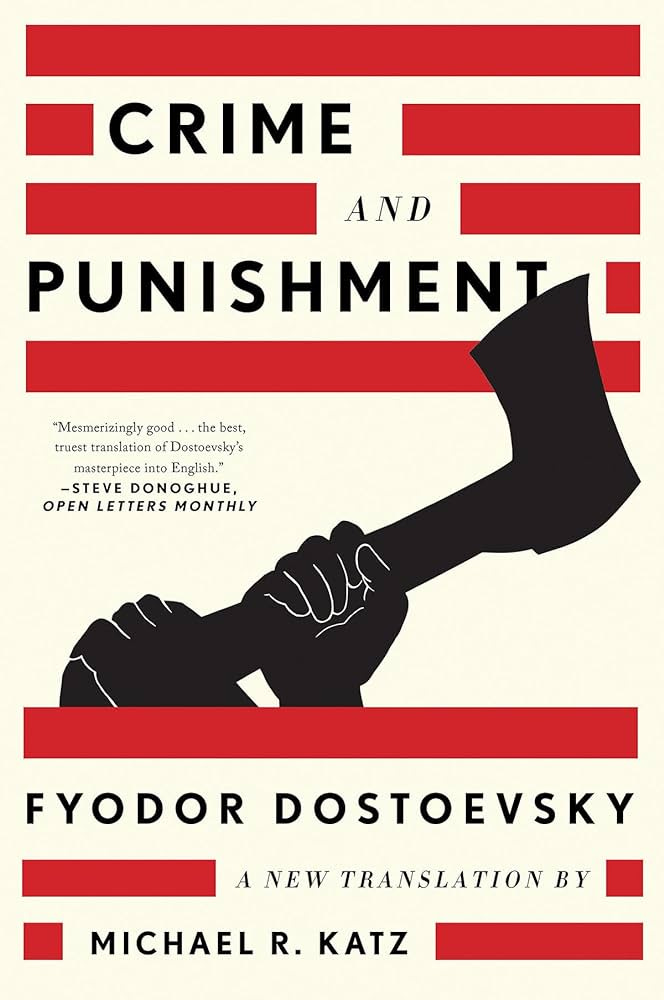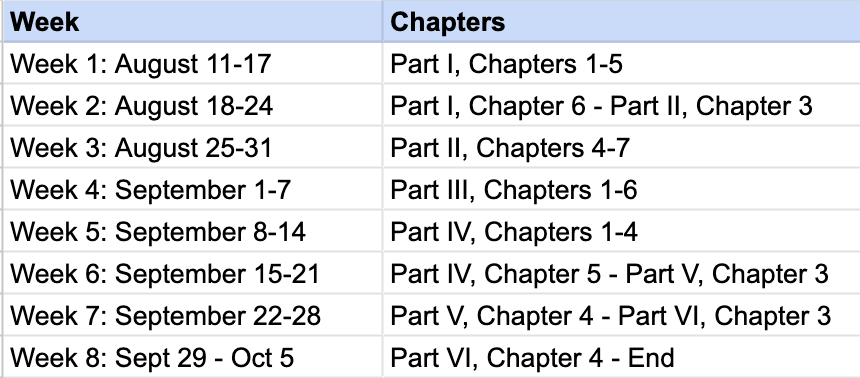3 Reasons to Read Dostoyevsky's "Crime and Punishment" This Year
Plus tips on translations and our upcoming reading schedule
Note: This email is going out to all Big Readers — free and subscribed alike. If you’re already a paying member, you’ll see a “Subscribed” message where there are normally clickable buttons.
Hi there, readers!
Starting August 11th, The Big Read will dive into one of the great works by one of the great all-time authors in the history literature. Published in Russia in 1866, Crime and Punishment is the first of Fyodor Dostoyevsky’s five most important novels.
Following the mind and actions of Rodion Raskolnikov, Dostoyevsky provides one of the most powerful, psychologically probing, and layered accounts of a character descending into madness. Guilt, madness, free will, isolation — the themes are admittedly big and even intimidating, but in Dostoyevsky’s hands you’ll find unique perspectives you’ve perhaps never encountered before.
Below you’ll find tips on translations, the reading schedule, and the benefits of subscribing.
Join us to read what is truly one of the most influential novels ever published.
3 Reasons to Read Crime and Punishment This Year
1. Dostoyevsky explores the human condition in a way that’s wildly relevant to today’s society.
Crime and Punishment dives headfirst into the complexities of human nature, exploring themes of guilt, redemption, and the struggle between good and evil. In our fast-paced, chaotic world, Dostoyevsky's exploration of the human psyche is more relevant than ever. The story invites us to reflect on our own choices and the impact they have on the people (and society) around us.
2. The story helps us understand the consequences of isolation — both physically and psychologically.
Raskolnikov, the protagonist, grapples with intense feelings of isolation and alienation (even if self-imposed). In an era where technology can both connect and divide us, Crime and Punishment offers a poignant reminder of the dangers of isolation and the importance of human connection. Dostoyevsky's narrative encourages us to reach out, connect with others, and find solace in community.
3. It’s a masterclass in psychological thrills.
For fans of psychologically intense thrillers, Crime and Punishment is a must-read. Dostoyevsky masterfully builds suspense and tension, drawing readers into Raskolnikov's tortured mind. The novel's intricate plot and deep character development keep readers on the edge of their seats, making it a gripping and thought-provoking read that stands the test of time.
Don't miss this opportunity to explore a literary gem that unexpectedly speaks to the heart of our modern philosophical struggles.
The Benefits of Subscribing
When you subscribe for $5/month (or $50/year), you’ll get the following:
Weekly recaps with background, contextual material, and highlights from that week’s chapters.
Access to our robust weekly discussions, where you’ll get invaluable insights from a diverse community of readers.
A group Zoom call at the end to discuss the book.
The motivation and accountability to read an all-time classic. Even a great story sometimes requires a bit of endurance.
The Best Translations of Crime and Punishment
You’ll find a lot of translations for this classic novel. My first time around, I read the Pevear/Volkonsky translation (1992), which is by far the most common in bookstores and very well regarded. I loved it and immediately knew I wanted to read through it with this group. It was never difficult, always engaging, and just as psychologically insightful as I expected.
As a translating couple, Pevear and Volkonsky are known for their meticulous word-by-word translations as well as their literary quality, hewing to the original phrasing as much as possible.
This time around, I’m going to read Michael Klatz’s highly acclaimed “new” translation from 2018. Bookish writer Joel Miller wrote this about it:
“It took almost a century and half, but Michael R. Katz has finally given us the translation of The Brothers Karamazov Dostoevsky and his English readers deserve. Katz transforms the novel into a legal thriller worthy of John Grisham. You think I jest? I do not. It crackles and zings. Every paragraph is impassioned, fiery, and intense. Characters jump from the page. I couldn’t wait for the next weird thing that was going to happen to these fascinating all-too-human characters.”
For the majority of readers, either of these two translations are what you’re most likely to find in bookstores and have the best reputation among readers and reviewers.
That said, there are a few others you’ll find out there:
Sidney Monas was published in 1968 and, at the time, was known for its modern accessibility. It’s still found today in some classic editions.
Oliver Ready, whose translation was published in 2014, is another relative newcomer on the block. It’s noted for its fresh approach that captures Dostoyevsky’s nuances.
David McDuff’s translation was published in 1991, and received good reviews but was almost immediately overshadowed by Pevear/Volkonsky’s 1992 release.
Reading Schedule
As noted above, our reading schedule starts on August 11. Each Sunday morning, a recap of the previous week’s reading will arrive in your inbox. That said, the schedule is just an unofficial guide — read at your own pace, if you want, and know that the weekly recaps/discussions follow the below schedule.
You can also view the Google sheet here.
I hope you’ll join me!
-Jeremy






I’m doing the Katz version. I’ve read Gogol, The Brothers Karamazov, and Tolstoy (who I much prefer to Dostoyevsky). I’m hoping this one can redeem Dostoyevsky for me. Brothers K was such a slog. Really looking forward to it!
Here's some more praise for the Katz version ($2.99 Kindle):
"These are the voices of Crime and Punishment, in all their original, dazzling variety: pensive, urgent, defiant, and triumphant. This new translation by Michael Katz revives the intensity Dostoevsky’s first readers experienced, and proves that Crime and Punishment still has the power to surprise and enthrall us."
― Susan McReynolds, Northwestern University
"Mesmerizingly good…the best, truest translation of Dostoevsky’s masterpiece into English. It’s a magnificent, almost terrifying achievement of translation, one that makes its predecessors, however worthy, seem safe and polite."
― Steve Donoghue, Open Letters Monthly